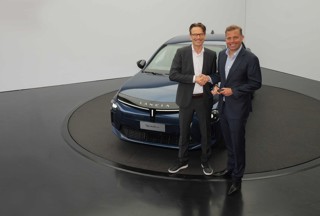McLoughlin hopes to roll it out to the UK; he is already looking at a feasibility study in London.
The initiative is based on BMW Connected Drive which enables Sixt to set the territory in which the car moves. It’s managed via iPhone.
“This service is complementary to rental and to leasing; it would give us a year/month/day/hour product offering – it’s about flexible mobility,” McLoughlin says. “In Germany, 40,000 customers signed up in the first year.”
They pay a one-off fee of E29.99 per person to join. Average use is twice a month and half-an-hour per journey.
“This is a solution to attract new clients into Sixt, a catch-all philosophy around urban mobility,” McLoughlin adds.
He anticipates continued growth in flexi-rental, particularly from medium-sized companies fearful of committing to long-term leasing in the current economic climate.
“It’s cheaper than rental and more expensive than leasing but these companies don’t want to be lumbered with too many cars,” says McLoughlin.
“They can keep the vehicles for up to six months but can hand them back early with no penalties.”
Launched last year, McLoughlin is targeting 500 flexi-rental units in 2013, a “conservative view”. “It’s about having a solution for different customer needs,” he adds.
Sixt-commissioned research showed that one in six companies using rental products has subsequently chosen not to buy cars. These are mainly urban based.
It is lobbying the Department for Transport to promote the use of car club vehicles – McLoughlin estimates there are around 3,500 in the UK – and rental cars.
“Car share works as an alternative because you save money, it’s more convenient and you get a better car.”
Smaller businesses tend to be the earlier adopters; McLoughlin anticipates substantial growth in this sector.
Fleets’ biggest gripes with rental companies usually concern being charged for damage or fuel which they believe is unreasonable. Sixt believes technology provides the solution to this.
It has recently developed a hand-held PDA which sends an email to the customer once the vehicle is returned outlining any additional charges together with a reminder about their agreement.
Telematics will play a future role, providing rental companies with information about how and where cars are being driven. McLoughlin believes it will result in more accurate billing.
“The process has to be squeaky clean,” he says. “Technology, innovation and people are required to change customers’ mindsets.”





















Login to comment
Comments
No comments have been made yet.